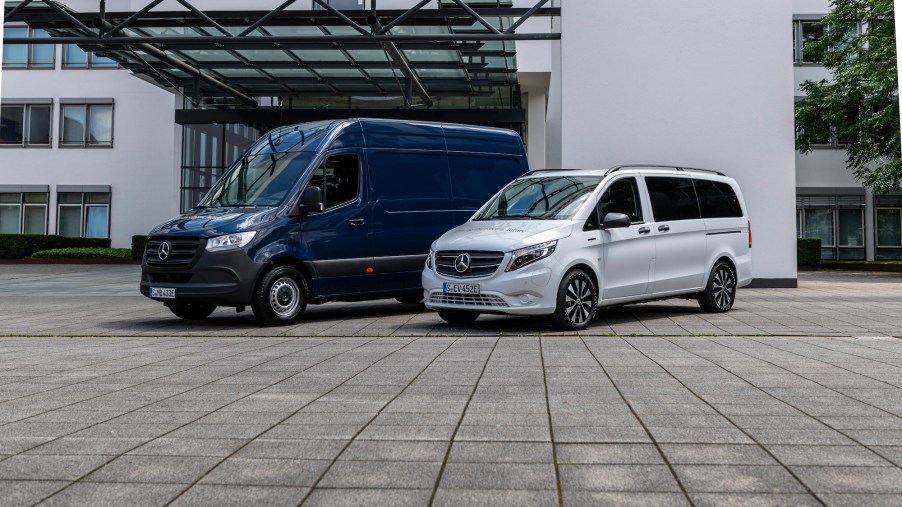
The New Electric Mercedes Sprinter Isn’t the Right Choice for a Camper Van
Recently, Mercedes-Benz announced plans for a new electric Sprinter van to sell in Europe and the United States in 2023. That’s right — a fully electric version of the Sprinter that promises zero emissions. But will the new Mercedes-Benz eSprinter be affordable? And is it a viable candidate for a camper van conversion?
The all-new Mercedes-Benz eSprinter
Mercedes-Benz’s December announcement about the new eSprinter’s development revealed it would be newly designed to allow for electric and gas powertrains. The new models will have space for larger batteries that go up to 120 kWh. Mercedes will sell the vans in electric and internal-combustion-engine models in Europe and the United States in late 2023.
Europe has been using commercial vans for some time, and you see plenty of them on their roads instead of the pickup trucks you see in the States. But the U.S. is beginning to embrace commercial vehicles because of the many benefits they offer.
These commercial vans are pretty versatile, Outside reports. With low load heights, they offer cargo protection from theft and inclement weather. They’re also pretty inexpensive to operate. With the 120-kWh battery, they boast a range of as much as 224 miles, Outside says.
Electric models would be ideal for urban delivery drivers and contractors. Tax incentives could help keep costs down because the bigger 120-kWh battery would likely add $24,000 to the vehicle’s MSRP. In Europe, where locations are densely populated, shorter ranges are OK. But in the U.S., a longer electric range is a necessity.
Would the new Mercedes-Benz eSprinter work as a camper van?
The folks at Outside consider vans’ potential for conversion into mobile living vehicles. But can any given vehicle convert into an apartment on wheels? Can it be equipped to handle off-roading?
They weighed the new electric Sprinter’s potential as a van for enthusiasts who want a camper vehicle with zero emissions. The answer wasn’t so simple.
One reason the forthcoming Sprinter might not be a good candidate for conversion is the price. The gas-fed models are expected to start at $35,000. A Sprinter large enough to convert into a mobile living space with four-wheel drive would likely cost nearly $75,000.
The eSprinter would get costly fast. According to Outside, an electric model with a 120-kWh battery pack would pose an additional expense of $20,000 to $30,000.
Range is another obstacle. The 224-mile electric range with the 120-kWh battery won’t take you far in the States. Estimated ranges are intended to give you an idea of how long an EV will drive under normal use on paved roads. It doesn’t factor in the energy used with rough roads, temperature extremes, inclines, and the extra weight of a living area. Those factors can reduce the electric range by more than half, Outside reports.
And then, depending on your itinerary, would you be able to find a charging station?
The perfect work van
Those considering the Mercedes eSprinter for commercial use might be in luck, especially in large urban areas. The two-wheel-drive model would perform just fine on paved roads and help keep the cost down. And with a 224-mile range between charges, the vans will save businesses plenty on fuel costs. Plus, you’ll likely be close to somewhere the battery can be charged.
Vans like the eSprinter offer ample storage space and might qualify for tax incentives depending on the location.
Best of all, businesses using such vans like the 2023 Mercedes eSprinter can advertise themselves as environmentally friendly. By using vans with zero emissions, businesses will find favor with the eco-conscious. They’ll also set a good example that other businesses might follow.


